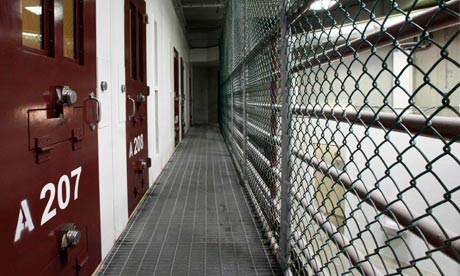Guantánamo hunger-strike inmates forced to drink dirty water, court hears
Matt Williams
 |
Guards swept through communal cellblocks on Saturday and moved prisoners into one-man cells in an attempt to end the strike. Photograph: Bob Strong/Reuters
Judge declines plea in emergency motion asserting guards are displaying 'deliberate indifference' to medical needs of strikers April 15, 2013 A federal judge declined a plea for relief from Guantánamo Bay hunger strikers on Monday despite hearing that guards displayed "deliberate indifference" to inmate's serious medical needs and forced them to drink dirty water. But the sitting judge denied an emergency motion for relief filed on behalf of one of the striking inmates, ruling that he did not have jurisdiction over the matter. He added that petitioner Musa'ab Omar al Madhwani – who is said to be in "imminent danger" of death – had "self-manufactured" his health situation. The development comes as President Barack Obama faces increased pressure to address current issues at the centre, and renewed calls for it to be closed down completely. The proposed closure of Guantánamo Bay was one of Obama's first announcements on entering the White House in 2008, but the policy was dropped, apparently in the face of pressure from Congress. Critics, however, say Obama has avoided taking other actions, such as sending home prisoners cleared for release. In recent days, disturbing reports of the treatment of more than 40 hunger strikers and violent clashes with guards have again drawn attention to the plight of remaining inmates. An op-ed in the New York Times on Monday from prisoner Samir Naji al Hasan Moqbel details the painful process of being force-fed by prison authorities. The Yemeni-born inmate wrote: "I will never forget the first time they passed the feeding tube up my nose. I can't describe how painful it is to be force-fed in this way. As it was thrust in, it made me feel like throwing up. I wanted to vomit, but I couldn't. "There was agony in my chest, throat and stomach. I had never experienced such pain before. I would not wish this cruel punishment upon anyone." His testimony comes after Shaker Aamer, the last British resident being held at Guantánamo, described the treatment of hunger strikers such as himself as "systematic torture". Aamer – who has spent 11 years at Guantánamo despite never being charged – told his lawyer Clive Stafford Smith that the US base may soon be dealing with its first fatalities as a result of the current hunger strike. "I might die this time," he said to Stafford Smith in a telephone call last week, adding: "I cannot give you numbers and names, but people are dying here." Over the weekend, violent clashes broke out at the detention camp as guards forcibly moved inmates out of communal areas and into solitary cells where they can be more closely monitored. US troops fired four "less-than-lethal rounds" in the confrontation, but no major injuries were reported. But in testimony that went before Judge Hogan on Monday, it was suggested that guards have stopped providing drinkable water to hunger strikers, insisting instead that they drink from unsanitary sinks. Lawyers for the petitioner say he is in a "grave medical state" having refused all food for more than 30 days. Dr Stephen Xenakis, who has been certified by Judge Hogan as an expert witness, spoke to al Madhwani on 11 April, a day after he collapsed. In a declaration that went before the court, he subsequently wrote: "My clinical judgement, to the best of my abilities and to a reasonable degree of medical confidence, is that Mr La Madhwani has suffered serious deterioration in his medical condition such that his life may be in imminent danger". He added that action by the guards appeared to be retaliatory, and had "further downgraded" al Madhwani's "will to live". "The unimpeded availability of drinkable water is particularly critical to hunger strikers, such that the denial of drinkable water is another form of deliberate indifference to their obvious serious medical needs". Of the 166 detainees still at the base in Cuba, 43 have been classified as hunger strikers, but lawyers claim the true figure of those participating is far higher. Of those, it is believed around a dozen are being force-fed to keep them alive. Source |
No comments:
Post a Comment